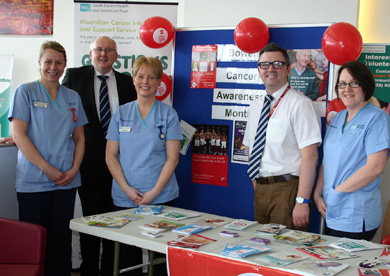April is bowel cancer awareness month.
Bowel cancer is a general term for cancer that begins in the large bowel. Depending on where in the bowel the cancer starts, bowel cancer is sometimes called colon cancer or rectal cancer. Symptoms of bowel cancer include blood in your stools (faeces), an unexplained change in your bowel habits, such as prolonged diarrhoea or constipation, and unexplained weight loss.
[caption id="attachment_48885" align="alignright" width="390"] Promoting Bowel Cancer Awareness Month are: (L/R) Sarah Christie (Colorectal Nurse Specialist), Mr Jeffrey Campbell (Consultant Colorectal Surgeon), Fiona Morris (Bowel Screening Nurse Specialist), Mr Bill Campbell (Specialist Registrar), Martina Finn (Colorectal Nurse Specialist).[/caption]
Promoting Bowel Cancer Awareness Month are: (L/R) Sarah Christie (Colorectal Nurse Specialist), Mr Jeffrey Campbell (Consultant Colorectal Surgeon), Fiona Morris (Bowel Screening Nurse Specialist), Mr Bill Campbell (Specialist Registrar), Martina Finn (Colorectal Nurse Specialist).[/caption]
Factors that increase your risk of getting bowel cancer include:
* Age: around 80% of people diagnosed with bowel cancer are over 60.
* Diet: a diet high in fibre and low in saturated fat could reduce your bowel cancer risk. A diet high in red or processed meats can increase your risk.
* Healthy weight: leaner people are less likely to develop bowel cancer than obese people.
* Exercise: being inactive increases the risk of getting bowel cancer.
* Alcohol and smoking: high alcohol intake and smoking may increase your chances of getting bowel cancer.
* Family history and inherited conditions: having a close relative with bowel cancer puts you at higher risk of developing the disease.
* Related conditions: having certain bowel conditions can put you more at risk of getting bowel cancer.
The earlier bowel cancer is caught, the easier it is to treat.
This is why it is so important to;
- · Understand the causes of bowel cancer
- · Act if you develop symptoms of bowel cancer
- · Take part in the NHS bowel cancer screening programme when you are invited to participate
The early symptoms for bowel cancer are very similar to other, much less serious problems with the bowel. It is very important to be aware of what is normal for you, so you can recognise any unusual changes and act quickly to get them investigated. Seek advice from your GP If you recognise any unexpected changes in bowel habits that have lasted at least 3 weeks.
The good news is that bowel cancer can be successfully treated in over 90% of cases, if it is diagnosed at an early stage, before it has had a chance to grow and spread. Regular screening has been shown to be very effective in detecting changes in the bowel, like polyps, before they have a chance to change and become a life-threatening illness.
The Northern Ireland Bowel Cancer Screening Programme offers screening every two years to all men and women aged 60 to 74. An invitation letter is sent to this target group and followed two weeks later by a screening test kit .The test is completed in the privacy of the persons own home. If the test is positive, the participant will be notified of the result and will be asked to undertake a further investigation.
The Colorectal Nurses have been working with Bowel Cancer UK to raise awareness of bowel cancer and they plan to promote and display bowel cancer awareness material in public places throughout the South Eastern Trust area.
]]>























